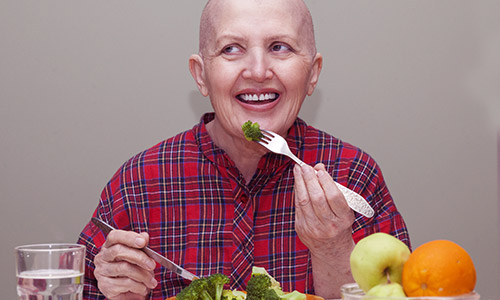A checklist for cancer nutrition during treatment
- Overview
- Full article
- Related articles

Choosing
to eat a healthy diet is one of the best ways you can influence your overall
health. Healthy eating will help you maintain your energy levels and sense of
wellbeing and research shows that eating a healthy diet could help prevent at least one in ten cancers in the UK as well as reduce your risk of developing new cancers.
As
a guide, to achieve a healthy diet, you should aim to:
- Eat regular meals
- Eat at least five portions of various fruit and vegetables a day
- Choose wholegrain carbohydrates such as brown rice and wholegrain pasta
- Include lean protein such as pulses, fish, eggs, meat, poultry and vegetarian alternatives
- Include dairy or dairy alternatives, e.g., soya to provide calcium and other vitamins and minerals
- Include two portions of fish per week, including at least one oily source
- Choose unsaturated oils and spreads in small amounts
- Drink eight cups/glasses of fluid a day
- Drink no more than 14 units of alcohol a week, with at least two alcohol-free days
- Limit highly processed fast foods.
Living
with cancer can make it more difficult to follow a healthy diet, with nausea, vomiting, diarrhoea and constipation, poor appetite and
taste changes to potentially contend with.
Even
if you are hungry, chemotherapy or radiotherapy may cause you to suffer from a
dry or sore mouth which makes eating difficult. Likewise, complications due to
the location of your cancer - such as tumours in the gastrointestinal tract - may physically limit your ability to swallow or digest food. Understandably,
these complications may mean your diet suffers, leaving you lacking in
nutrients.
Keeping food down when you're having cancer treatment
If you find food smells off-putting, you may find it helpful to eat cold food, which has less aroma. Another tip is to ask other people to prepare your meals for you. Alternatively, perhaps you could try ready-meals, so you don’t have to make the food yourself or be in the same room while it’s cooking.
Eating with others or while listening to the radio or watching TV can also be helpful: distractions can help you eat more without noticing.
Ideally, you should try to maintain your weight throughout your cancer treatment by eating a healthy diet. However, if you find yourself losing your appetite or going off certain foods while undergoing treatment and this leads to weight loss, it may be necessary to amend your diet to obtain the maximum amount of calories possible from the foods you can eat. Eating calorific foods, or fortifying your meal with richer ingredients can help. Eating regular snacks and drinking calorific liquids can also be useful.
Eat whatever you can stomach, rather than trying to stick to healthy eating guidelines. Calories from any food are better than none.It’s important to speak to your medical team if you’re struggling to maintain your weight. There may be medications they can prescribe to help you.
Last updated Tuesday 19 March 2019
First published on Tuesday 19 March 2019
